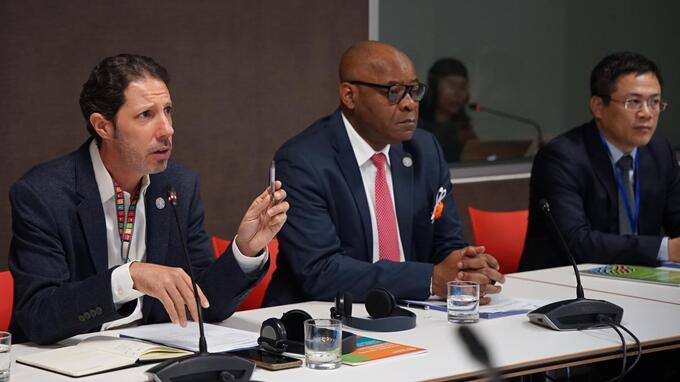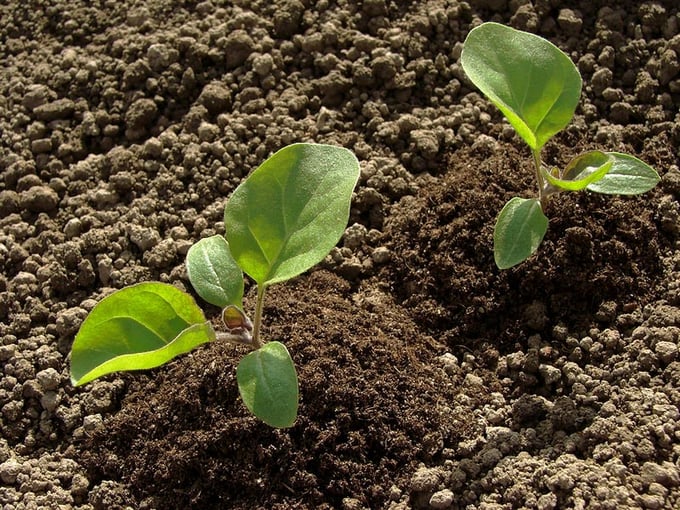May 22, 2025 | 16:52 GMT +7
May 22, 2025 | 16:52 GMT +7
Hotline: 0913.378.918
May 22, 2025 | 16:52 GMT +7
Hotline: 0913.378.918
To ensure soil sustainability and health, serving the goals of agroecology and sustainable food systems, the development of a system to monitor activities related to soil health is required. This content was emphasized at the kick-off meeting "Support for the development of the national soil health strategy and action plan" recently held in Hanoi.

Pierre Ferrand, Agricultural Officer, Technical Consultant, FAO Regional Office for Asia and the Pacific (leftmost). Photo: Linh Linh.
Soil health is facing great challenges in Vietnam such as acidification, salinization, reduced organic matter content, erosion, landslides, and many more serious problems, especially in vulnerable areas. Cultivation activities and intensive farming in some areas have exhausted nutrients and micronutrients in the soil. This is also one of the sources responsible for pollution to plant health. In addition to subjective factors, soil health is also affected by other objective factors such as population growth, modernization, and urbanization, which require a lot of land use change and affect the environment. large to the extent of forest cover, vegetation.
Pierre Ferrand, Agricultural Officer, Technical Consultant, FAO Regional Office for Asia and the Pacific raised the issue. “These processes take place both openly and quietly, but there is not yet an assessment or official data which help us see to what extent the soil is affected. There is also a lack of an appropriate system to accurately monitor the effectiveness of land and cropland management measures in terms of soil quality and health improvement.”
The FAO representative also noted that the current soil-related data had not been updated regularly, some data was outdated while information related to soil management and planning processes for land use remained limited. This was also considered a limitation for Vietnam to meet international commitments.
In addition to the impacts of climate change, soil health is under a lot of pressure in the current context as Vietnam is the world's leading agro-product exporter of a variety of commodities such as rice, coffee, and pepper. Information from the Department of Crop Production, Ministry of Agriculture and Rural Development (MARD), shows that the total area of annual crops in Vietnam is 10.8 million ha, of which 4.2 million ha are short-term crops on sloping land which is severely affected by erosion. The delta of 5.7 million ha is affected by pollution, especially in industrial parks and residential areas and this area is the prime object of increasing emissions, especially due to rice cultivation.

Soil health is a matter of priority in Vietnam at present.
As agriculture holds a certain role and responsibility in the land use process, Le Van Duc, Deputy Director of the Department of Crop Production (MARD), said that the soil assessment program required the active participation of the Ministry of Agriculture and Rural Development and the Ministry of Natural Resources and Environment. This was a proposal from the agricultural sector in contributing to amending the Land Law. “We find that in the period of the market economy, soil was paid little attention because enterprises were more interested in trading fertilizers and pesticides. Meanwhile, there is no strategy on soil health, and the training of human resources in the soil sector has not been focused," said Mr. Duc.
According to Dao The Anh, Deputy Director of the Vietnam Academy of Agricultural Sciences (VAAS), the issue of soil health is an integrated and interdisciplinary issue. Playing the role of coordinating and promoting the agricultural sector's ecological transformation, the unit has contributed to the development of the Action Plan for Sustainable Food System Transformation, in which the protection of natural resources, including agricultural land, is a matter of priority.
“It can be said that agricultural land is a precious resource of Vietnam because the land is limited while the population is large. Apart from ensuring food security for more than 100 million people, Vietnam is also a food exporter. Therefore, we need to re-evaluate the importance of soil health to ensure sustainable food production and security,” said VAAS Deputy Director Dao The Anh.
The VAAS representative also said that the FAO-supported project should be combined with other components of the agroecology transformation strategy, integrating soil health into practices to propagate and train farmers as well as local officials, change their thinking, perception, and influence at different levels to "avoid the mindset of fully exploiting agricultural land without paying attention to its sustainability”.
Translated by Samuel Pham
![Reducing emissions from rice fields: [2] Farmers’ commitment to the soil](https://t.ex-cdn.com/nongnghiepmoitruong.vn/608w/files/news/2025/05/05/dsc08881jpg-nongnghiep-140632.jpg)
(VAN) Clean rice cultivation model in Thuong Tan commune, Bac Tan Uyen district, is assisting local residents in achieving sustainable agriculture by substantially reducing costs, increasing productivity, and protecting the environment.

(VAN) At the conference to disseminate Resolution No. 68, AgriS introduced its digital agricultural ecosystem and reaffirmed its commitment to accompanying the Government in promoting private sector development and sustainable agriculture.

(VAN) 'Blue Ocean - Blue Foods' initiative is designed to restore marine ecosystems and establish sustainable livelihoods for local communities by cultivating a minimum of 1,000 hectares of cottonii seaweed in the first three years.
/2025/05/21/4642-3-112707_603.jpg)
(VAN) The V-SCOPE project has made direct contributions to three out of six pillars of the Comprehensive Strategic Partnership between Vietnam and Australia.

(VAN) Facing the threat of rabies spreading to the community, Gia Lai province urgently carries out measures to vaccinate dogs and cats on a large scale.

(VAN) Disease-free livestock farming not only protects livestock herds but also stabilizes production and livelihoods for many farmers in Tuyen Quang.

(VAN) Japan's grant aid project contributes to capacity building, promoting organic agricultural production, and fostering sustainable community development in Dong Thap province.